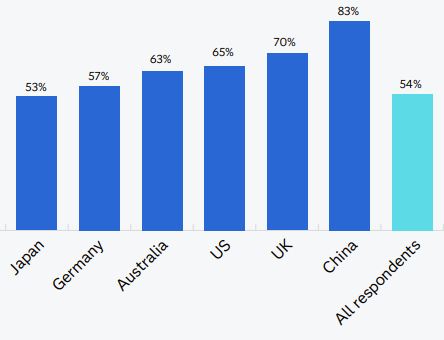Australian organisations have ranked fourth in an assessment of how widely enterprises in 16 countries are using and implementing generative AI. The survey, conducted by data analytics firm SAS, found that 63% of Australian businesses are now using generative AI.
The findings, based on responses from 1,600 global AI and data analytics decision makers, found that Australian generative AI usage is ahead of the global average and that Australia is leading the pack when it comes to the deployment of generative AI-related policies.
Which countries are fully implementing generative AI?
Sixty-three percent of Australian organisations say they use generative AI. Australian enterprises sit behind China (83%), the U.K. (70%) and the U.S. (65%), according to SAS, but are ahead of the global average, with 54% of enterprises worldwide using generative AI.
Businesses in the APAC region as a whole, led by China, are among the world’s most voracious adopters of AI. Although North America is ahead in overall usage of AI (70%), APAC businesses are not far behind, with a total of 63% using it at some level within their organisations.

Usage does not mean they’re fully implementing the tool. Only 8% of Australian enterprises surveyed by SAS have fully implemented generative AI, behind the 11% global average. Many local businesses are still experimenting with or piloting generative AI use cases.
SEE: 9 Innovative Use Cases of AI in Australian Businesses in 2024
It is a similar story in China, where, despite very high usage, only 19% of organisations have fully implemented generative AI. The U.S. is leading the pack when it comes to full implementation, SAS found, with 24% of organisations fully deploying the technology.
Australian organisations satisfied with generative AI rollouts
Australian businesses achieve good results when they do deploy AI. For example:
- 91% reported better employee experience and satisfaction, compared with 89% globally.
- 85% said they are making savings on operational costs, compared with 82% globally.
- 89% stated that customer retention is higher thanks to AI, compared with 82% globally.
Craig Jennings, SAS vice president and managing director of ANZ, said he was seeing local organisations improve employee satisfaction and operational efficiencies while freeing up resources for “enhanced innovation and customer experiences.”
Data security is the top generative AI concern in Australia
Seventy-two percent of Australian respondents name data security as their top concern when it comes to generative AI. According to SAS, this was followed by:
- Data privacy (64%).
- Ethical implications (64%).
- Over-reliance or dependence on generative AI (59%).
SEE: AI applications to complicate hybrid multicloud sprawl in Australia
Australia is relatively more ready to implement regulations to help alleviate these concerns. SAS found that almost three quarters (73%) of respondents from Australian organisations said they are either fully or moderately prepared for generative AI regulations.
Challenges with governance and monitoring
Australian decision makers said technological limitations (32%), a lack of transparency and accountability (28%), and a lack of clear guidelines or standards (21%) were the biggest challenges when implementing effective governance and monitoring of generative AI.
Skills gaps are not as bad as in other regions
Despite a generative AI-related skills shortage, APAC respondents, including Australians, actually have less difficulty finding skills (49%) than other regions do. Europe has the most difficulty at 56%, while only 44% of North American businesses have a problem in this area.
Australia set up well for generative AI growth
Australian enterprises have a number of foundational ingredients in place to support deploying generative AI strategically and effectively — even if they’ve been slower than other countries in fully deploying these tools. These elements include:
- A strong understanding of generative AI technology.
- The widespread implementation of generative AI use policies.
- Dedicated budgets for new generative AI initiatives.
Additionally, the report found that:
- 87% of Australian respondents reported that they understood AI well or had a moderate personal understanding, compared with 82% of respondents around the world.
- More Australian businesses (72%) have implemented generative AI use policies compared with North America (63%), South West and Eastern Europe (60%), and Northern Europe (58%).
Almost all (94%) of Australian organisations that are planning to invest in generative AI in the next financial year have managed to secure a dedicated budget for the technology. This was on par with the APAC region as a whole (94%), but ahead of Northern Europe (91%), South West and Eastern Europe (91%) and North America (89%), according to SAS.
SAS’s Jennings said that, overall, industries as diverse as financial services, life sciences, and retail in Australia were punching above their weight when it comes to maturity in understanding and adoption of generative AI, which bodes well for the future of the technology in the region.

